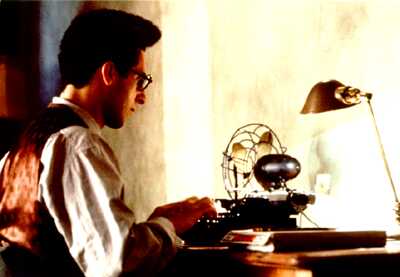

I am so glad I watched Barton Fink before commenting on A Serious Man. I've since discovered I'm not even close to the only one who sees the profound similarity between these two films, but it was an important independent discovery for me.
A Serious Man follows Larry Gopnik (Michael Stuhlbarg), a professor whose life is spiralling ever out of control. Things happen to him with a sense of absurdity, of randomness, and the more he seeks out meaning in the parameters of his religion, his community, his basic human nature, the more things fall apart. Everything in this film is given a sense of great import -- Jewish folklore, a conversation with a student, dreams -- which is thereafter stripped away. The only constant, it seems, is senselessness itself. And even it takes on sensible, coherent forms.
Meanwhile, Barton Fink follows Barton Fink (John Turtorro), a New York playwright who moves to Hollywood on the invitation to write film. Once he gets there everything becomes complicated--he can't write his script, his literary heroes fall from their pedestal in his eyes, the unexpected becomes the mainstay of the film. And he's pretty helpless throughout all of it.
In fact, in both films the main character is a small, understated Jewish intellectual without much pluck and plenty to be nervous about. They're also both trying to stick to their convictions against difficult odds, and both ultimately fail (albeit in different ways).
In both films pathetic fallacy plays a tremendous role in the symbolism of character conflict. In Barton Fink an early scene blatantly juxtaposes water crashing up against a rock with Barton Fink walking into Hollywood. Then there's a fire scene that couldn't drive home the message of things falling apart any more clearly than it does. In A Serious Man there's a tornado. (I'll say no more.)
In both films a character is pursuing a generic, understated sub-plot (son Danny Gopnik trying to repay the school bully, Barton Fink attempting to escape his problems by fantasizing over a picture of a beautiful woman on a beach), and the final image for both films has those generic plot-lines gently refuse such commonplace narrative engagement.
In both films the main character meets someone early on who seems integral to the story's central conflict; in both films this secondary character dies, abruptly, halfway through.
In both films the universe is directed by its own fickleness (in A Serious Man, by having a cacophony of characters weave in and out, variously offering hope and despair to Larry Gopnik; in Barton Fink, the Capital Pictures President, Jack Lipnick, best exemplifies this when his responses to Fink's progress with the B-movie wrestling picture operate on seemingly no fixed logic whatsoever).
And the list does, in fact, go on.
But at the crux of this comparison lies a more important question: So what? So what if the two films follow the same tropes, use the same devices, have the same stylistic quality? Are they any good? Is one better than the other?
Narrative-wise, I didn't like A Serious Man. I found my irritation with it grounded in the superficiality of many plot devices: The dream sequences, and the absurdly extreme waking from them, trying too hard to add layers of false meaning. The multiplicity of characters, each with their own singular quirks, intent on conveying the depth and complexity of any individual's life-web -- but instead just giving me more people not to care about over the course of the film. The completely random opening sequence, evidently thrown in for kicks because its only relation to the rest of the film is that... the characters from pioneering times are also Jewish? (Seriously, I later learned the Coen Brothers threw this scene in just 'cause -- which some people will likely think is awesome: I don't.)
Stylistically, A Serious Man has some amazing images, and wonderful little scenes (I especially love "Old Man with Walkman"). The Coen Brothers are damned intelligent filmmakers, and that shows through in everything they do. They are just also, in this film, prone to excess -- and for this reason I don't particularly care about Larry's struggle for a sense of meaning in the face of meaninglessness. I care even less about every other person inside the film.
In short, Mamet did it better in Homicide. The Coen Brothers themselves do it better in Barton Fink. (It helps, immensely, that they had John Candy.) But ultimately, I encourage you to watch both and -- shock! gasp! -- decide for yourselves. How's that for defying the spectre of helplessness that looms over us all!
No comments:
Post a Comment